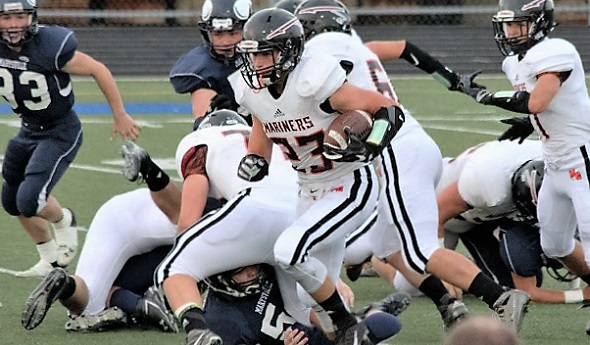
Marine City Focused on Comeback Quest
By
Paul Costanzo
Special for MHSAA.com
October 11, 2016
Ryan Alexander was in a familiar place this past Thursday.
 The Marine City senior running back was at East China Stadium, the junior varsity team on the field in front of him playing against Warren Woods-Tower and a group of junior program football players behind him, preparing to get onto the big field and play at halftime.
The Marine City senior running back was at East China Stadium, the junior varsity team on the field in front of him playing against Warren Woods-Tower and a group of junior program football players behind him, preparing to get onto the big field and play at halftime.
He and his Mariners teammates were coming off a win against archrival St. Clair, and had just finished their last practice in preparation for a Week 7 game against Warren Woods-Tower, one they would also win.
All of that is familiar for Alexander and the Mariners. The start of the season, however, was far from it.
“It was different than anything I’ve ever experienced,” Alexander said of Marine City’s first 0-4 start since 1971. “I’ve been on varsity for three years now, and to start 0-4, it was the first time I’ve ever felt anything like that since I’ve been in the program, since I’ve been in Marine City.
“It was a new feeling, but it was also a sense of motivation. It pushed me harder knowing that we had something to prove and that everyone was doubting us because we were 0-4. It’s hard to go through, but I think it made us a better team.”
Alexander and his teammates are on the road back, sitting at 3-4 and eyeing two more wins which could possibly preserve the school’s streak of qualifying for the postseason, which started in 1998. He said getting there would show those junior program players that by coming together as a team, you can accomplish anything.
The Mariners have already shown their coach plenty.
“I wondered, because our program has had so much success, what would happen if we had a bad start like this, how would that team be and how difficult would it be to coach,” Marine City coach Ron Glodich, who is in his fifth season as head coach after serving as a longtime assistant in the program. “What I found is these kids are incredible. Their perseverance and their work ethic has not changed. Nobody has quit, even though I challenge them week in and week out, nobody has quit. The bigger the challenge I give them, the bigger they step up.”
‘We live football’
Football in Marine City has a bit of a “Friday Night Lights” feel to it.
The town with a population of a little more than 4,000 essentially shuts down on game nights to support its team. Not long ago, it moved trick-or-treating because it conflicted with a Friday night playoff game. When the team went to Ford Field for MHSAA championship games in 2007, 2011 and 2013, it filled its entire side of the lower bowl with fans clad in orange and black.
“It’s a football crazy town,” Alexander said. “We live football.”
Kids grow up wanting to be Mariners as much as they grow up wanting to be Wolverines or Spartans, and you can’t even go to a JV game without seeing groups of them playing a side game of touch – or tackle – at East China Stadium.
“They were always winning, ever since I’ve been a kid and ever since my parents have been around,” senior lineman Andrew Steinmetz said. “It’s a great feeling to grow up here, live here and then play here.”
Always winning isn’t hyperbole, especially for someone Steinmetz’s age. The playoff streak is only scratching the surface of the Mariners’ success in the past few decades.
The program won MHSAA championships in 2007 and 2013, and – prior to this year – had lost more than two games in a season only three times since 1992.
From 2006 through 2009, Marine City had three undefeated regular seasons, and in the only exception, it went 13-1 with a Division 4 championship. The Mariners’ last losing season came in 1982.
There have been stars who went onto play Division I college football – Brendon Kay, a 2008 graduate went to Cincinnati and was the Most Valuable Player of the Belk Bowl, and Anthony Scarcelli, who was the Associated Press Division 3-4 Player of the Year in 2011 and is currently a senior on Central Michigan University’s football team – but most of Marine City’s success has come thanks to players who don’t have a recruiting site ranking.
“When you mention the name Marine City outside the area, it’s common for someone to say, ‘Oh, you’ve got a great football program,’” Glodich said. “And we’re proud of that. It’s been a long time since we built it, and a lot of people are proud of it in the area and they come out to support it. It’s nice that that’s linked to the town, and that people believe we have a great football program. And I believe we do.”
 In Marine City, even 8-1 teams catch flack. At 0-4, the loud minority of the fan base gets more vocal.
In Marine City, even 8-1 teams catch flack. At 0-4, the loud minority of the fan base gets more vocal.
“As any coach who doesn’t win, there are critics out there,” Glodich said. “I happened to get a letter and I shared it with the kids. I told them, ‘We’re all in this together. You’re being criticized in the stands, I’m being criticized, so understand that we’re all in this together and it’s all about getting better.’
“The good news is, I’m at the point in my career where I know that this staff does a great job. So when you get letters like that, you chuckle and say, ‘OK, this person is venting, but they don’t know what the hell they’re talking about.’ And I would tell that person if they ever had the guts to look me in the eye, I would tell them, ‘You don’t know what the hell you’re talking about.’”
Glodich’s players said they were able to shut out the outside noise, for the most part, and anything that did enter their brains was used as motivation. Alexander said it went in one ear and out the other, because practicing with a clear mind was much more necessary than reacting to insults.
Even better, however, was the fact there was much more support than derision. Marine City may be football crazy and unaccustomed to waking up on a Saturday after a loss, but its love for football goes beyond a stunning win-loss record.
“The parents and the past players, they really had our backs,” senior lineman Tom Kaminski said. “(Former player) Ethan Cleve made a nice Facebook message on the Marine City football fans page, and (former player) Jarrett Mathison was saying, ‘Don’t worry about it, it will get better.’”
Writing the final chapter
The message within the team was similar to Mathison’s, but the players knew they were the ones who would have to make things better.
“A lot of it came from themselves,” Glodich said. “After that fourth loss, we challenged them and said you guys make a decision of how you want to move forward. That’s where your senior leadership and the guys that really care about the program, they kind of step forward and they rally the troops. We challenged them come Monday, and they responded to the challenge.”
The change could be seen in practice, and it translated into a 37-29 win against Madison Heights Madison in Week 5. That was followed by a 27-6 win against St. Clair in Week 6 and most recently a 49-31 win against Warren Woods-Tower in Week 7.
“We just had to put our heads down and keep fighting for it, because we knew we were better than what we were,” Kaminski said. “It’s big on your shoulders, because everyone’s used to 9-0 teams here, so that was a big wake-up call, but I think we’ve got it.”
As stated above, while this is a position Glodich never wanted to be in, he said he’s always wondered what would happen if a Marine City team had a start like this one. He’s wondered how the players would react. He’s wondered how difficult it would be to coach a team that no longer held its playoff destiny in its own hands before the midpoint of the season.
“I’m amazed that these kids are working this hard – I don’t know if any other team that was 0-4 is working as hard as we do,” Glodich said. “It’s just a credit to these kids and their background; they’re not afraid to work. The kids that come to school here in this community are not afraid to work, and that’s why I’m one of the luckiest guys in the state to be able to coach in this community.”
The 0-4 start may have put the Mariners on the brink of playoff extinction, but their opponents in weeks 1-4 could wind up helping push them over the top when it comes to playoff selection, should Marine City get to 5-4.
Algonac, Port Huron Northern, Detroit Loyola and Marysville were a combined 25-3 through seven weeks, with one of those losses a Northern defeat against Marysville.
The Mariners are taking the one-game-at-a-time approach to the end of the season, but they know that can help. They know they can do something special to close it out, and accomplish something no Marine City team has done before – rebound from a start that could cause some to pack it in.
Glodich said he can’t look past the next game, but admits he and his coaches have talked to the players about writing the final chapter in their book, and how they want their story to end.
Alexander has already started writing in his head.
“It would mean the world (to finish 5-4) especially because it’s my senior year and I’d love to end on a high note,” he said. “I’d love to be the team that started 0-4, won the last five games and then proved what we have in the playoffs. We have a good team, we have a good shot.
“We just want to get to 5-4. We don’t really focus on anything else (in terms of playoff points). If we get there, it doesn’t matter, we’ll be happy.”
 Paul Costanzo served as a sportswriter at The Port Huron Times Herald from 2006-15, including three years as lead sportswriter, and prior to that as sports editor at the Hillsdale Daily News from 2005-06. He can be reached at [email protected] with story ideas for Genesee, Lapeer, St. Clair, Sanilac, Huron, Tuscola, Saginaw, Bay, Arenac, Midland and Gladwin counties.
Paul Costanzo served as a sportswriter at The Port Huron Times Herald from 2006-15, including three years as lead sportswriter, and prior to that as sports editor at the Hillsdale Daily News from 2005-06. He can be reached at [email protected] with story ideas for Genesee, Lapeer, St. Clair, Sanilac, Huron, Tuscola, Saginaw, Bay, Arenac, Midland and Gladwin counties.
PHOTOS: (Top) Marine City's MJ Frank cuts through an opening against Marysville this season. (Middle) A group of Mariners surround and take down a Port Huron Northern ball carrier. (Photos courtesy of the Marine City football program.)
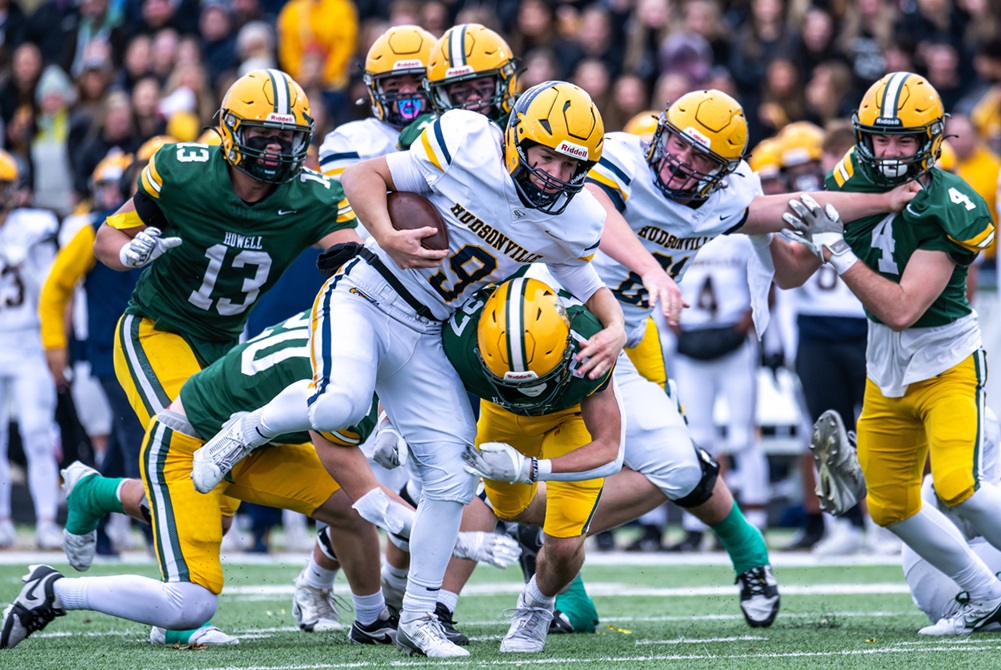
1st & Goal: 2024 Playoffs Week 3 Review
By
Geoff Kimmerly
MHSAA.com senior editor
November 18, 2024
We’ve rounded the final turn toward the finish of this 2024 football season.
 All four 8-player finalists are decided, and we lead off today’s “Review” with a look back and how they earned their trips this weekend to Northern Michigan University’s Superior Dome.
All four 8-player finalists are decided, and we lead off today’s “Review” with a look back and how they earned their trips this weekend to Northern Michigan University’s Superior Dome.
We also glanced at all 32 Regional Finals in the 11-player bracket as those winners pulled within one more victory of booking Thanksgiving weekend at Ford Field.
8-Player Division 1
HEADLINER Pickford 34, Indian River Inland Lakes 18 This proved to be Pickford’s closest game so far this season, but the Panthers (12-0) advanced to their first MHSAA Final since 2019 when they won Division 1 – and also avenged a 12-0 Semifinal loss to Inland Lakes from a year ago. Pickford did so by holding the Bulldogs (11-1) well below its average of 53 points per game heading into the weekend. Click for more from WLUC.
HEADLINER Deckerville 49, Mendon 32 Mendon scored first and trailed by only three at halftime, but Deckerville outscored the Hornets 20-6 over the final two quarters. The Eagles (12-0) slowed down a Mendon rushing attack that hadn’t run into too many obstacles this season, and Deckerville quarterback Hunter Garza ran for 228 yards and three touchdowns and threw for two fourth-quarter scores. Click for more from the Huron Daily Tribune.
8-Player Division 2
HEADLINER Crystal Falls Forest Park 49, Onekama 24 The Trojans are headed back to the Finals for the first time since winning Division 2 in 2017. Forest Park put up more points than Onekama had given up in a game this season and held the Portagers (10-2) to eight fewer than their season average. Click for more from the Iron Mountain Daily News.
HEADLINER Morrice 36, Britton Deerfield 0 Morrice (11-1) dominated on both sides of the ball and with Wyatt Cartier finding the end zone from his positions on offense and defense, running for three scores and returning an interception for a fourth. The Patriots (10-2) were averaging 53 points per game entering the weekend. Click for more from the Lansing Herald.
11-Player Division 1
HEADLINER Detroit Catholic Central 35, Belleville 21 As anticipated, and evidenced by the sizable crowd filling the stands, this was a game many had hoped to see for some time – and they watched DCC (12-0) win its first Regional title since 2017 while ending the career of one of the most accomplished players in MHSAA football history. Belleville (10-2) finished a combined 50-4 with three trips to Ford Field and two Division 1 titles during quarterback Bryce Underwood’s four seasons on varsity. Click for more from the Oakland Press.
Big Performance from Samson Gash! 🚨💥
Check out the highlights of Detroit Catholic Central junior Samson Gash in their win over Belleville in the 2024 Division 1 Regional Final. Gash scored two touchdowns (1 rushing and 1 rushing) and he also made an interception on the… pic.twitter.com/GP622NSDYR
— STATE CHAMPS! Michigan (@statechampsmich) November 17, 2024
Regional Roundup Hudsonville 35 Howell 6 The Eagles (11-1) won their first Regional title since 2005 and ended Howell’s winningest season at 11-1, holding the Highlanders scoreless until the fourth quarter. Rochester Adams 21, Grand Blanc 14 Adams (10-2) improved to a combined 9-3 in the playoffs over the last four seasons by winning its first Regional title since 2021. Grand Blanc finished 9-3, its defeats by a combined 10 points. Detroit Cass Tech 21, Macomb Dakota 14 Alex Graham snagged the game-winning touchdown pass above two defenders with 19 seconds to play to lead Cass Tech (10-2) to its second Regional title in three seasons. Dakota finished 10-2.
11-Player Division 2
HEADLINER Birmingham Groves 21, Warren De La Salle Collegiate 19 Groves (12-0) took a seven-point lead into halftime and a one-point advantage into the fourth quarter on the way to claiming its second Regional title in three seasons. The Falcons’ victory also meant the end of De La Salle’s four-year streak of reaching Ford Field; the Pilots (8-3) were Division 2 runners-up a year ago. Click for more from the Detroit Free Press.
Regional Roundup Byron Center 52, Portage Central 14 Byron Center (11-1) won its first Regional championship and set a program record for wins, taking the next step after falling in a Regional Final last year. Portage Central finished 8-4 after winning its first District title since 2021. East Lansing 49, Saginaw Heritage 27 East Lansing (9-3) repeated as a Regional champion by scoring more points than Heritage (8-4) had given up in a game since Week 3 of the 2023 season. Orchard Lake St. Mary’s 27, Gibraltar Carlson 3 St. Mary’s (9-3) won its first Regional title since 2016, thanks in part to holding the Marauders (10-2) to 39 points below their average and single digits for the first time since 2022.
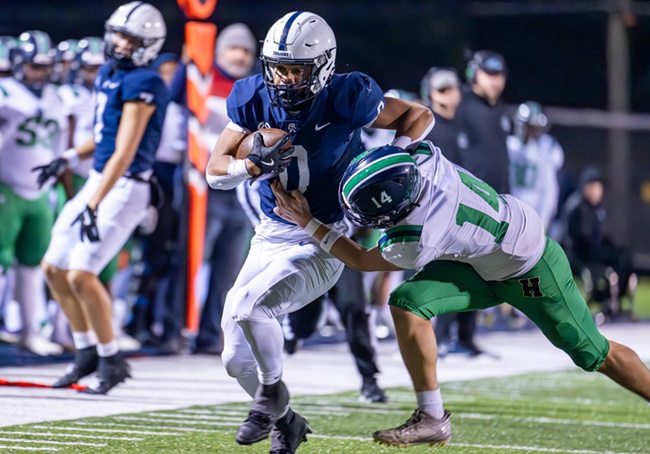
11-Player Division 3
HEADLINER Zeeland West 36, Grand Rapids Forest Hills Central 20 West (11-1) repeated as a Regional winner and this time ended the season for the reigning Division 3 champion, after having lost to FHC 18-14 in the Semifinal a year ago that sent the Rangers to Ford Field. The Dux also had won their regular-season meeting in Week 6, as FHC finished this fall 9-3. Click for more from the Grand Rapids Press.
Regional Roundup Mason 22, Walled Lake Western 17 After falling to Western 20-17 in Week 8, Mason (10-2) avenged to clinch its fourth-straight Regional title and end the Warriors season at 11-1. DeWitt 70, Petoskey 34 DeWitt (12-0) ended Petoskey’s longest playoff run since 2014 by tying its highest-scoring output this fall – and moving into a tie for eighth all-time for single-season scoring by an 11-player team, with 682 points. The Northmen finished 11-1. Detroit Martin Luther King 34, River Rouge 0 King (9-3) ran its Regional title streak to four with a fourth-straight season defeating Rouge during the playoffs since falling to the Panthers (6-5) in a 2020 Regional Final.
11-Player Division 4
HEADLINER Niles 37, Portland 34 Niles (11-1) not only avenged last season’s 21-14 loss to Portland in this round, but in doing so won its first Regional title and set a program record for wins for the second-straight season. Portland is a combined 43-7 over the last four after completing its fourth-straight double-digit finish at 11-1 as well. Click for more from the Niles Daily Star.
Niles vs. Portland.
Regional Championship rematch from 2023.
The Vikings get their revenge!
Niles beats Portland, 37-34, to be a regional champion for the first time ever! 🏆@NilesAthletics @scot_shawNHSfb @BennettTalen @SamRucker14 @Peyton642126111 @brendenolsen22 pic.twitter.com/33dOjkFS96
— Bennett Wise WSBT (@BennettWiseWSBT) November 16, 2024
Regional Roundup Grand Rapids South Christian 28, Whitehall 21 In another one-score Regional Final, Whitehall (8-4) came back to get within striking distance but fell to the Sailors in a Regional Final by this score for the second time in three seasons. South Christian (8-4) needs one more win to reach Ford Field for a third-straight year. Goodrich 42, Haslett 13 Goodrich (11-1) repeated in winning this Regional Final matchup from a year ago as well, controlling the line to run for five touchdowns and adding a sixth on a turnover. Haslett finished 8-4 after beginning 1-3, and with three losses this season to teams playing in Semifinals. Harper Woods 48, Macomb Lutheran North 3 The reigning champion is one win from returning to Ford Field, as Harper Woods (9-3) held Lutheran North to 30 points fewer than its season average. The Mustangs set a program record for wins in finishing 10-2.
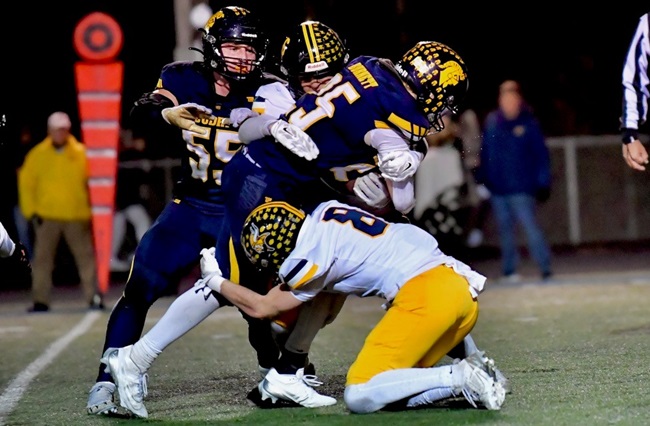
11-Player Division 5
HEADLINER Grand Rapids Catholic Central 21, Kalamazoo United 14 Dale Gant’s touchdown with 3:04 to play was the decider as Catholic Central (8-4) claimed a ninth-straight Regional title. United finished 9-3, with its highest win total since 2018 and two of those losses to opponents still playing. Click for more from Michigan Sports Radio.
Highlights of Grand Rapids Catholic Central's win over Kalamazoo United in the Division 5 Regional Final on November 15th, 2024
🎥 WOOD-TV | @MHSAA @GRCC_CougarsFB pic.twitter.com/Ciwm9QoviW
— STATE CHAMPS! Michigan (@statechampsmich) November 17, 2024
Regional Roundup Frankenmuth 35, Gladwin 0 The Eagles (12-0) added a second win over Gladwin (8-4) over the last four weeks to clinch a fifth-straight Regional championship. Pontiac Notre Dame Prep 45, Armada 19 In winning their first Regional title, the Fighting Irish (10-1) tied their school record for wins. Armada (10-2) also set a school record for wins this fall. Flat Rock 41, Ann Arbor Father Gabriel Richard 0 Flat Rock won a second-straight Regional title with its second shutout this season. FGR finished 7-5 after winning its first District title since 2012.
11-Player Division 6
HEADLINER Lansing Catholic 49, Newaygo 36 Lansing Catholic (9-3) is another team that has entered the spotlight these playoffs, with three wins over opponents that entered those matchups a combined 26-4. The Cougars took advantage of turnovers to get a quick jump this time and followed quarterback Alex Fernandez to their second Regional title in four seasons. Newaygo finished its winningest since 2012 at 9-3. Click for more from MLIVE.
Regional Roundup Boyne City 34, Reed City 21 Boyne City (10-2) rushed to its first Regional title since 2014 on the legs of Owen Hewitt, who scored four touchdowns. Reed City finished 9-3, reaching nine wins for the fifth-straight season. Jackson Lumen Christi 42, Constantine 6 Last season’s Division 7 champion is enjoying similar success in Division 6 as Lumen Christi (11-1) is seeking to make the Ford Field trip for the third-straight year. Constantine finished 8-4. Marine City 52, Detroit Central 26 Marine City (10-2) downed Central for the second time in four weeks after previously defeating the Trailblazers (8-4) in Week 9, 37-15. The Regional title was the Mariners’ second in four seasons.
11-Player Division 7
HEADLINER North Muskegon 23, Menominee 0 North Muskegon made the long drive to the western Upper Peninsula, which allowed additional time to celebrate one of the most notable wins in recent program history. The Norsemen (11-1) claimed their second-straight Regional title and avenged last year’s Semifinal loss to Menominee (10-2), which ended up finishing Division 7 runner-up. This time, North Muskegon shut down a Maroons offense that was averaging 45.5 points per game and put 32 on the Norsemen last season. Click for more from the Muskegon Chronicle.
Regional Roundup Millington 28, Pewamo-Westphalia Defense also was the story in this matchup, as the Cardinals (12-0) posted their fifth shutout this fall, holding the Pirates (9-3) without a point for the first time since 2012. Schoolcraft 28, Hudson 16 Schoolcraft (11-1) will play in the Semifinals for the first time since 2020 after taking the lead during the closing minute of the first half and holding off the Tigers (10-2) the rest of the way. Hudson entered the game giving up only 8.4 points per game and hadn’t allowed more than 17. Monroe St. Mary Catholic Central 55, Leslie 18 St. Mary (12-0) won its first Regional title since 2019 as it continued to surge offensively – the Falcons topped 50 points for the second time this season and also second week in a row. Leslie finished its first winning season since 2012 at 10-2, totaling one more win than the last three seasons combined.
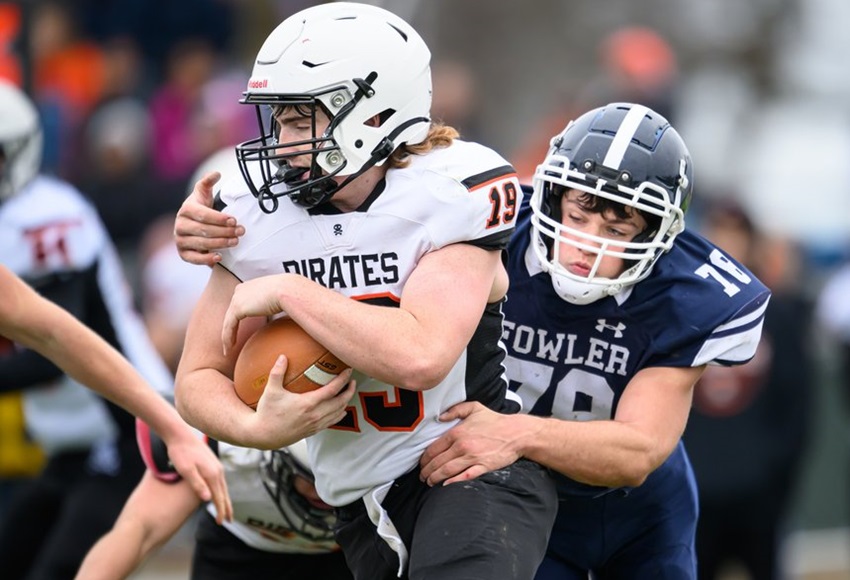
11-Player Division 8
HEADLINER Fowler 25, Harbor Beach 7 Fowler (12-0) has impressed all season and now will play in a Semifinal for the first time since 2019. But this might have been the Eagles’ best win so far this fall. Fowler held a Pirates offense averaging 44 points per game to a single score and put 25 points on a defense that was giving up just 5.5 ppg entering the weekend. Harbor Beach finished 11-1, its best since 2018. Click for more from the Lansing State Journal.
Regional Roundup Beal City 14, Iron Mountain 7 Beal City (10-2) also handed the lone loss of this season to its opponent, traveling to Iron Mountain to win its second-straight Regional title and third in four seasons. The Aggies also defeated the Mountaineers (11-1) in a 2023 Regional Final. Decatur 41, Reading 0 Decatur (11-1) claimed its first Regional title since 2002, continuing a tremendous improvement from 4-5 a year ago. The Raiders have given up only 13 points over three playoff games. Reading finished 7-5, also a considerable turnaround from 2-7 last fall. Riverview Gabriel Richard 30, Detroit Loyola 12 RGR (10-1) was another repeat Regional champion, and this time set a program record for wins in adding a second this fall over Loyola (5-7). The Pioneers also had defeated Loyola 29-8 in Week 5.
MHSAA.com's weekly “1st & Goal” previews and reviews are powered by MI Student Aid, a division within the Department of Lifelong Education, Advancement, and Potential (MiLEAP). MI Student Aid encourages students to pursue postsecondary education by providing access to student financial resources and information. MI Student Aid administers the state’s scholarship and grant programs that help make college Accessible, Affordable and Attainable for you. Click to connect with MI Student Aid and find more information on Facebook and Twitter @mistudentaid.
PHOTOS (Top) Hudsonville’s Bryce Fox (9) emerges from the grasp of multiple Howell defenders Saturday. (2) East Lansing’s Jace Clarizio (0) works to break the tackle of Saginaw Heritage’s Anthony Fries. (3) Goodrich’s Chase Burnett (25) takes on a pair of Haslett defenders. (4) Fowler’s Joe Epkey (78) wraps up a Harbor Beach ball carrier Saturday. (Top and East Lansing/Heritage photos by L.C. Arreguin/Team Arreguin Photos. Goodrich/Haslett photo by Terry Lyons. Fowler/Harbor Beach photo by Kolleth Photo.)

